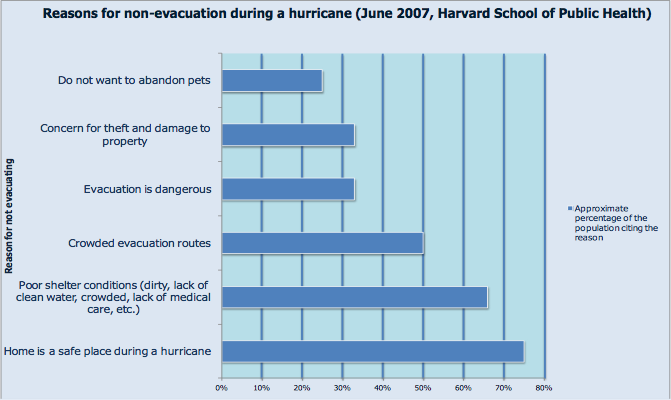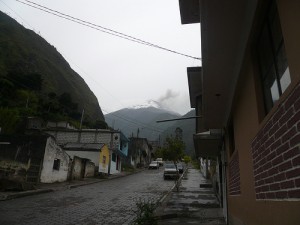
A survey conducted two years after Hurricane Katrina, of 5,406 people living within 20 miles of the Atlantic Ocean or Gulf of Mexico. About half of the respondents had lived through damaging hurricanes, and nearly a third would not evacuate again.
Nearly everybody, when asked if they would evacuate before a hurricane, will say, “Yes.” Very few people pause to deliberate, because the essence of the question as they see it is, “Do you choose life or do you choose death?” Unsurprisingly, most rational people choose life. Yet, in the actual circumstance of being faced with disaster, innumerable people, many of them educated and of sound mind, seem to choose the irrational course of action. What is nearly always overlooked with the aforementioned question, is that it is actually much more complex than asking, “Safety or peril?” Live adaptively or die prematurely?”
In the wake of Hurricane Katrina in the United States, there were 30,000 people in Louisiana who elected not to evacuate, despite the warnings of the government and meteorologists. Reasons for non-evacuation vary widely. One factor that was not listed as an impediment to evacuation was inadequate public warnings or hazard information. Thus, the public is plenty well informed of the risks, but in deciding, they put their own lives and maybe the lives of their families in peril.
Ecuador’s Example
To help understand the mindset of a person facing evacuation, imagine the scene in Baños, Ecuador, in 1999. A nearby volcano named Tungurahua has just rumbled to life, and scientists have advised the government to evacuate 16,000 people from their homes. The big eruption is coming, they warn. Shortly after, seismic and emissions monitors register a jump in activity and sirens blare in the night, waking up the locals. Fumbling with flashlights, they lift their children from their beds and grab the emergency bags, if they listened well enough to pack one. Many of them do not own cars, so they walk four hours to the designated shelter, and they wait. The fortunate ones will have family and friends in other cities ready to take them in, or they may be able to find work elsewhere. This is exceptional, because the majority of Ecuadorians in this area are farmers. Their entire existence is tied together and tethered to the same piece of land.
Soon the shelters, crowded and poorly ventilated, begin to fill with disease. Sickness spreads; with special fervour it afflicts children, the elderly, and pregnant women. The government hasn’t provisioned for the long-term support of so many people, so rations of rice are meagre. The refugees learn that their town has been occupied by the military in order to keep anyone from returning to the zone of exclusion, and rumours of looting whisper among the people. Although the volcano continues to eject fine flurries of ash, the big eruption still has not happened.
In squalid shelter conditions, people begin to alter their situational cost-benefit analysis. Living in an unanticipated amount of discomfort, with real risks to health and well-being, it starts to appear that living in the “danger zone” is preferable. It may be risky, but it is comfortable. In the case of Baños, citizens stormed the city and overtook the military by force, reclaiming their homes. Tungurahua is still erupting today, and the large forecasted event did not occur until 2006.
Fallible Forecasting
Forecasting is an imperfect science; most laypeople understand the burden of responsibility that scientists and governments must contend with in order to make a good decision with limited data, but they still need enough information to make a rational decision to stay or go. Without predicting a disaster, the next best course of action is to clearly communicate the risks and make the safest option the most attractive.
Making recent headlines, the L’Aquila earthquake scandal of Italy is a case study in poor information transfer. Three years ago an earthquake killed 300 people in the seismically active region after a statement from a government representative assured them that scientists weren’t anticipating “a big one”. The locals pressed for a manslaughter suit against six scientists and the government official, and won. Statements from representatives of the prosecution explain that nobody expected scientists to predict the exact time, location, and magnitude of the quake, but they expected clearer communication of risks. They say that without that information, people who would otherwise have left stayed and died due to a false sense of security.
However, based on human psychology in natural disasters and the inherent aspect of “risky behaviour” it seems dubious that the sole reason 300 people stayed behind was because the government told them to do so. In a parallel universe, 300 people were ordered to evacuate L’Aquila and didn’t, because some were worried about leaving their homes unattended, some didn’t want to move into a shelter, and others thought the government would save them if it was precarious enough.
It is resoundingly true from New Orleans, to Ecuador and Italy, to the recent Hurricane Sandy victims in the USA, that people will not always do what the government advises them to do. They will take a risk, because there is so much more at stake than life alone.




